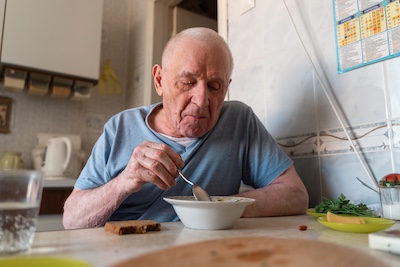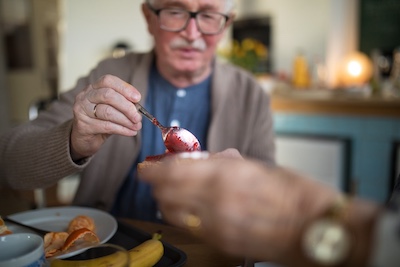As our loved ones age, many aspects of daily life naturally shift, including their relationship with food. It’s common for elderly individuals to experience changes in appetite due to factors like medication side effects, chronic health conditions, reduced physical activity, and changes in taste or smell.
However, maintaining proper nutrition is vital for overall health, energy, and quality of life, especially in later years.
If you’re caring for an elderly family member or friend, understanding how to navigate appetite changes can make a meaningful difference in their comfort and well-being.
In this article, we’ll explore why appetite changes occur in older adults, what nutritional risks to watch for, and practical, compassionate tips for supporting healthy eating habits during this season of life.
Why Appetite Changes Occur in Older Adults
Appetite naturally fluctuates throughout a person’s life, but aging often brings more consistent and noticeable changes. Understanding the causes can help you better support your elderly loved one’s nutritional needs.
Some of the most common reasons for appetite changes in the elderly include:
- Reduced Sense of Taste and Smell: The ability to perceive flavors and aromas often declines with age, making food less appealing.
- Medication Side Effects: Many medications can suppress appetite, cause dry mouth, or lead to nausea and gastrointestinal issues.
- Chronic Health Conditions: Illnesses like dementia, heart disease, kidney disease, and cancer can affect appetite and eating patterns.
- Dental Issues: Problems with teeth, gums, or ill-fitting dentures can make chewing uncomfortable or difficult.
- Slowed Digestion: Aging slows down the digestive process, sometimes leading to early feelings of fullness or discomfort after eating.
- Emotional Factors: Feelings of loneliness, grief, or depression can reduce interest in eating.
- Reduced Physical Activity: Less activity can lower energy needs and appetite.
Recognizing these underlying causes is the first step in addressing appetite changes and promoting better nutrition for elderly loved ones.

Risks Associated with Poor Nutrition in the Elderly
When older adults aren’t eating enough or aren’t getting the nutrients they need, it can impact both physical and mental health. Some risks of poor nutrition include:
- Unintentional Weight Loss
- Muscle Weakness and Frailty
- Weakened Immune System
- Delayed Healing
- Increased Risk of Falls and Injuries
- Cognitive Decline
- Fatigue and Low Energy
- Worsening of Chronic Health Conditions
By proactively managing appetite changes and focusing on nutrient-rich, enjoyable meals, you can help protect your loved one from these risks and enhance their overall well-being.
Practical Nutrition Tips for Elderly Loved Ones Facing Appetite Changes
Supporting elderly family members or friends with their nutrition doesn’t have to be complicated. Small, thoughtful adjustments can make a big impact. Here are practical tips to help encourage better eating habits while respecting their preferences and limitations.
1. Offer Smaller, More Frequent Meals
As people age, large meals can feel overwhelming or lead to discomfort. Offering smaller, nutrient-packed meals throughout the day can be more manageable and appealing.
Tip: Serve five to six small meals or snacks instead of three large meals. Include a balance of protein, healthy fats, and fiber in each.
2. Focus on Nutrient-Dense Foods
When appetite is limited, every bite counts. Prioritize foods that pack a lot of nutrition into smaller portions to help meet daily needs.
Examples:
- Greek yogurt with fruit and honey
- Nut butters on whole-grain toast
- Smoothies with fruits, vegetables, protein powder, and nut butter
- Hard-boiled eggs
- Avocado on toast
Avoid empty-calorie foods like sugary snacks or sodas, which provide little nutritional value.
3. Enhance Flavor and Presentation
Since taste and smell may diminish with age, enhancing the flavor and visual appeal of food can stimulate interest in eating.
Ideas:
- Use herbs, spices, and natural seasonings instead of excess salt.
- Add a touch of sweetness with honey, maple syrup, or fruit.
- Brighten dishes with colorful fruits and vegetables.
- Serve food on a plate with contrasting colors for visual appeal.
4. Incorporate Favorite Foods and Comfort Meals
Emotional connections to food remain strong throughout life. Including favorite dishes or nostalgic comfort foods can encourage eating, even when appetite is low.
Ask your loved one about their favorite meals or cherished recipes from the past. Even if these aren’t the healthiest options, offering them occasionally can bring joy and prompt appetite.
5. Make Mealtime a Social Experience
Eating alone often leads to reduced appetite in elderly individuals. When possible, make meals a shared event. Even brief company at mealtime can enhance the dining experience and improve food intake.
If in-person meals aren’t always possible, consider video calls during meals or arranging meal delivery from a favorite restaurant as a thoughtful treat.
6. Monitor Fluid Intake
Dehydration is a common concern in the elderly and can further suppress appetite. Encourage your loved one to drink water, herbal teas, or milk regularly throughout the day.
Tip: Offer flavored water, broths, or electrolyte-rich drinks for variety. Include water-rich foods like fruits, soups, and gelatin desserts to boost fluid intake.
7. Address Dental and Swallowing Issues
Difficulty chewing or swallowing can significantly affect appetite and nutrition. Make sure your loved one has regular dental checkups and address any denture or oral discomfort.
For those with swallowing difficulties (dysphagia), work with a healthcare provider or dietitian to modify food textures and recommend thickened liquids if needed.
8. Use High-Calorie Supplements Wisely
When regular meals aren’t enough to meet nutritional needs, consider adding oral nutrition supplements, like high-calorie shakes or protein drinks.
Important: Choose supplements designed for older adults and consult with a healthcare provider to ensure they’re appropriate and won’t interact with medications. These supplements can help fill nutritional gaps, especially when appetite is low or meal portions are small.
Look for options that offer a balance of protein, healthy fats, vitamins, and minerals to support overall health. You can also blend supplements into smoothies with fresh fruits, nut butters, or yogurt to improve taste and add extra calories.
9. Limit Empty Calories, But Allow Treats
While it’s important to focus on nutrient-rich foods, occasional treats can provide both calories and emotional comfort. A favorite dessert, cookie, or glass of wine (if medically appropriate) can lift spirits and support social bonding.
These small pleasures can help maintain a sense of normalcy and enjoyment around food, especially during challenging times. Balance indulgences with a foundation of healthy meals and snacks.
10. Be Patient and Respectful
Appetite changes in the elderly can be frustrating for caregivers and loved ones, but patience and empathy are essential. Avoid pressuring your loved one to eat and respect their preferences and choices.
Encourage without overwhelming, and celebrate small victories — whether it’s finishing a small meal, trying a new dish, or enjoying a favorite snack.

When to Seek Professional Help
While some appetite changes are a normal part of aging, persistent or severe changes can signal an underlying issue that needs medical attention. Reach out to a healthcare provider if your elderly loved one:
- Loses significant weight without trying
- Consistently refuses food or liquids
- Shows signs of malnutrition (fatigue, weakness, dry skin, confusion)
- Has difficulty chewing, swallowing, or digesting food
- Exhibits new or worsening depression or anxiety
A doctor, dietitian, or palliative care specialist can provide guidance, suggest nutritional supplements, or adjust medications contributing to appetite loss.
Conclusion
Appetite changes in elderly loved ones are common, but they don’t have to compromise health, comfort, or quality of life.
By understanding the reasons behind these shifts and offering compassionate, practical support, you can help your loved one maintain better nutrition and feel cared for during this chapter of life.
Simple strategies — like offering smaller, nutrient-rich meals, enhancing flavors, sharing mealtime companionship, and addressing medical or emotional concerns — can make a meaningful difference. Every thoughtful effort contributes to dignity, joy, and well-being in the later years.
If you have concerns about an elderly loved one’s appetite or nutrition, don’t hesitate to reach out to their healthcare team for personalized support and resources. Together, you can create a care plan that prioritizes nourishment, comfort, and connection.
